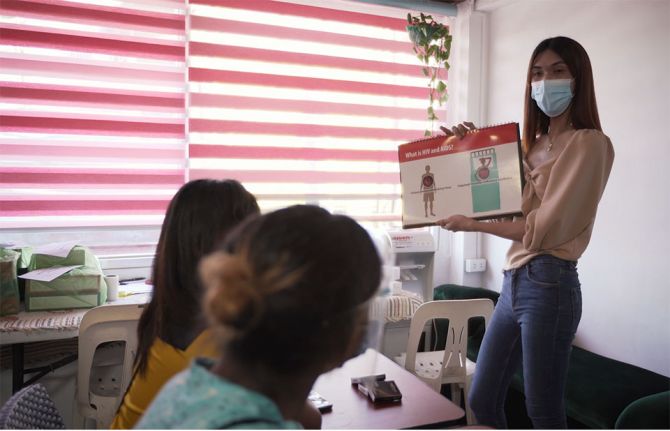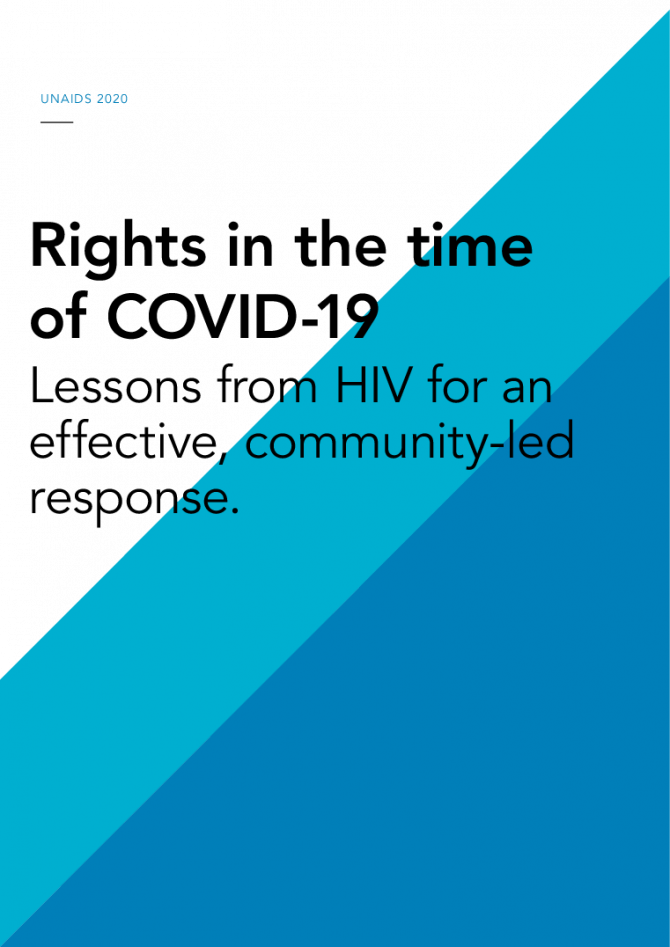
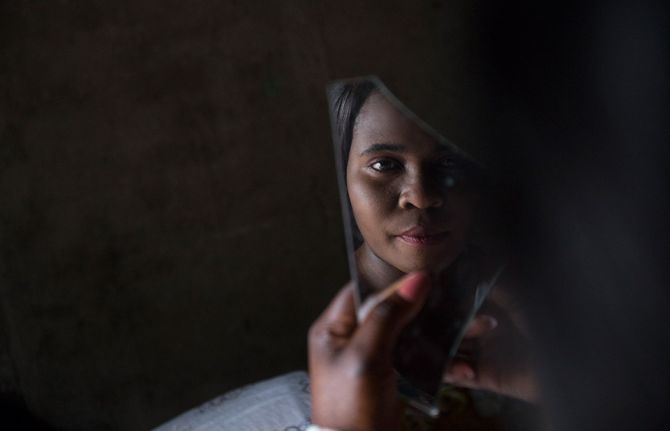
Press Statement
Sex workers must not be left behind in the response to COVID-19
08 April 2020 08 April 2020GENEVA, 8 April 2020—The COVID-19 pandemic, as with other health crises, exposes existing inequalities and disproportionately affects people already criminalized, marginalized and living in financially precarious situations, often outside social protection mechanisms.
During these difficult times, the Global Network of Sex Work Projects (NSWP) and UNAIDS wish to draw attention to the particular hardships and concerns facing sex workers globally, and are calling on countries to ensure the respect, protection and fulfilment of sex workers’ human rights.
As a result of the COVID-19 pandemic, sex workers all over the world are experiencing hardship, a total loss of income and increased discrimination and harassment. The criminalization of various aspects of sex work in the majority of countries serves to magnify the already precarious situation of sex workers in the informal economy. As sex workers and their clients self-isolate, sex workers are left unprotected, increasingly vulnerable and unable to provide for themselves and their families.
Sex worker-led organizations from all regions are reporting a lack of access to national social protection schemes and exclusion from emergency social protection measures being put in place for other workers, particularly where sex work is criminalized. Whenever and wherever possible, sex workers are responsibly self-isolating in response to governments’ calls. However, when they are excluded from COVID-19 social protection responses, sex workers are faced with putting their safety, their health and their lives at increased risk just to survive.
NSWP and UNAIDS are furthermore concerned at reports of punitive crackdowns against sex workers, resulting in the raiding of homes, compulsory COVID-19 testing, arrest and threatened deportation of migrant sex workers.
UNAIDS calls on countries to take immediate, critical action, grounded in human rights principles, to protect the health and rights of sex workers. Measures should include:
- Access to national social protection schemes for sex workers, including income support schemes.
- An immediate firewall between health services and immigration authorities in order to ensure that migrant sex workers can access health services.
- Emergency financial support for sex workers facing destitution, particularly migrants who are unable to access residency-based financial support.
- An immediate end to evictions and access to appropriate emergency housing for homeless sex workers.
- Stopping raids on sex workers’ homes and sex work premises and ensuring that all measures to protect public health are proportionate.
- An immediate halt to arrests and prosecutions for sex work-related activity, moving away from punitive measures and criminalization towards reaching and serving those most in need.
- An immediate end to the use of criminal law to enforce COVID-19-related restrictions, including forced COVID-19 testing and related prosecutions.
- Automatic extensions on visas due to expire as travel restrictions tighten. Immigration detention systems must support detainees in safe accommodation.
- The engagement of sex worker communities in responses—the meaningful involvement of sex worker-led organizations in emergency public health planning groups.
UNAIDS, as ever, stands ready to support countries in the implementation of the above recommendations.
UNAIDS
The Joint United Nations Programme on HIV/AIDS (UNAIDS) leads and inspires the world to achieve its shared vision of zero new HIV infections, zero discrimination and zero AIDS-related deaths. UNAIDS unites the efforts of 11 UN organizations—UNHCR, UNICEF, WFP, UNDP, UNFPA, UNODC, UN Women, ILO, UNESCO, WHO and the World Bank—and works closely with global and national partners towards ending the AIDS epidemic by 2030 as part of the Sustainable Development Goals. Learn more at unaids.org and connect with us on Facebook, Twitter, Instagram and YouTube.

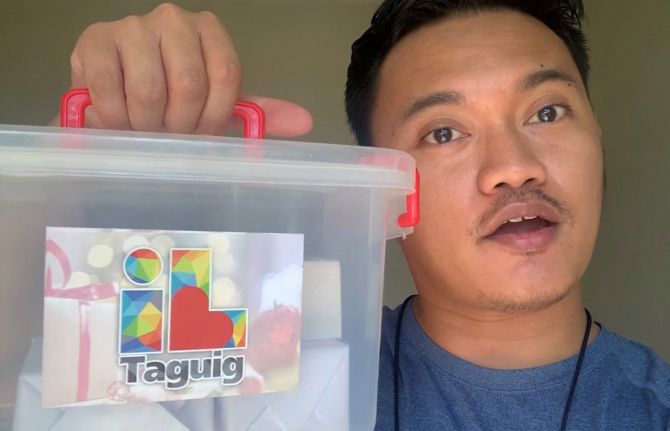
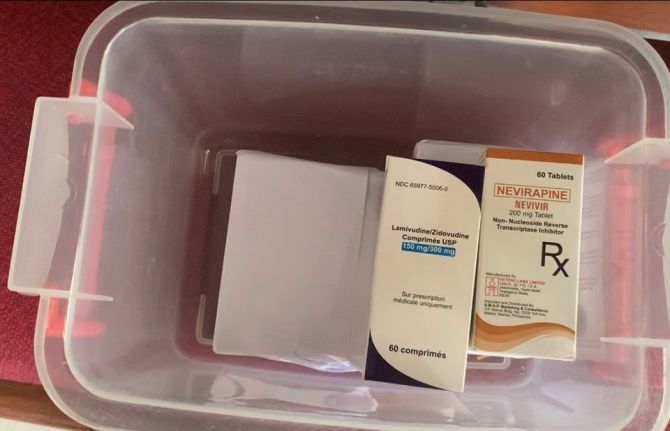
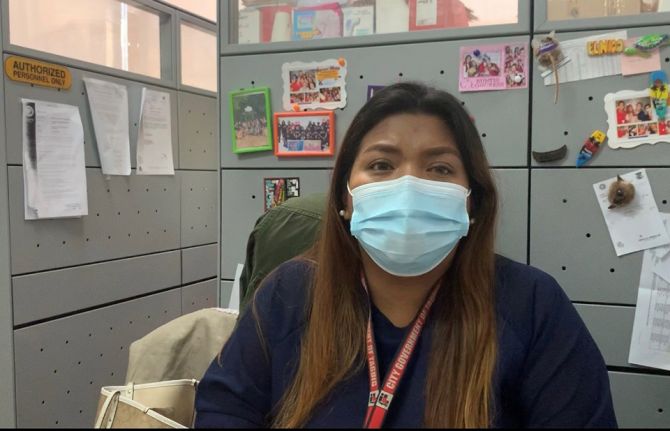
Feature Story
Ensuring that people living with HIV in the Philippines have access to treatment during COVID-19
08 April 2020
08 April 2020 08 April 2020The COVID-19 pandemic and the lockdown imposed by the Government of the Philippines to curb the spread of the disease are impacting the lives of people living with HIV across the country, creating a serious challenge to accessing life-saving antiretroviral therapy. To help address those challenges, civil society organizations have come together to support people living with HIV to access treatment.
Through a coordinated community-led mechanism, Network Plus Philippines, Pinoy Plus Advocacy Pilipinas, the Red Whistle and TLF Share Collective, are working together in the implementation of a new guideline issued by the Department of Health. The new guideline directs local authorities to ensure that people living with HIV can collect their medicine at the nearest HIV clinic and encourages the use of courier services for the pick-up and home delivery of antiretroviral therapy in order to avoid the risk of increased exposure to COVID-19.
“For many people living with HIV, accessing antiretroviral therapy from the nearest treatment hub is a welcome development. However, the nearest facility may not be within walking distance, and public transportation has been restricted. To be able to reach the HIV clinic, some need to pass through checkpoints, where they fear disclosure of their HIV status, as a few have already reportedly experienced,” said Richard Bragado, Adviser of Pinoy Plus Advocacy Pilipinas, an organization of people living with HIV, and the Administrator of Network Plus Philippines, the national network of organizations of people living with HIV.
The Red Whistle, a platform that raises awareness about HIV, has mobilized a pool of 40 volunteers to collect antiretroviral therapy refills from treatment hubs and deliver them to people across the country. TLF Share Collective, a civil society organization working on the sexual health, human rights and empowerment of lesbian, gay, bisexual, transgender and intersex (LGBTI) people, tapped the volunteers of its partner community-based organizations to deliver antiretroviral therapy.
“People living with HIV are displaced by the pandemic. Some lost their source of income and had to return to their original residence after losing their jobs. Ensuring uninterrupted treatment is not to be compromised. This is an integral part of our work on human rights,” said Anastacio Marasigan, Executive Director of TLF Share Collective.
Home delivery is made possible through a joint effort of civil society organizations and health facilities. “We ask treatment hubs to issue a letter of authorization to show to the checkpoint authorities that the driver is delivering essential medications. We are also working with local authorities to avoid unintended disclosures of confidential information of our clients at the checkpoints,” said Benedict Bernabe, Executive Director of the Red Whistle.
To identify the nearest treatment hubs, lists of antiretroviral therapy clinics have been disseminated through different channels, with the Red Whistle partnering with MapBeks, an online LGBTI mapping community, to create the Oplan #ARVayanihan, a map that includes all treatment hubs and primary HIV care facilities.
People living with HIV can share and ask for information through different platforms. Among them is the PLHIV Response Center, established by Pinoy Plus Advocacy Pilipinas to link callers with services. The hotline disseminates information about treatment hubs available and gives advice on how to access antiretroviral therapy.
TLF Share Collective has developed a tool to monitor the delivery of antiretroviral therapy by the community volunteers. The organization also developed frequently asked questions cards and consolidated existing hotline numbers.
“UNAIDS has regularly coordinated with civil society organization since the beginning of the COVID-19 outbreak, providing technical guidance and ensuring synergy with the efforts of the government,” said Louie Ocampo, UNAIDS Country Director for the Philippines.
The United Nations Development Programme and UNAIDS have developed a rapid survey to assess the different issues affecting people living with HIV in the Philippines. In addition to access-related issues, the results of the survey show the urgent need to protect human rights and facilitate access to mental health and social protection services. The findings have been shared with the government in order to ensure that actions are based on the constantly evolving situation in the context of the COVID-19 pandemic.
Our work
Region/country

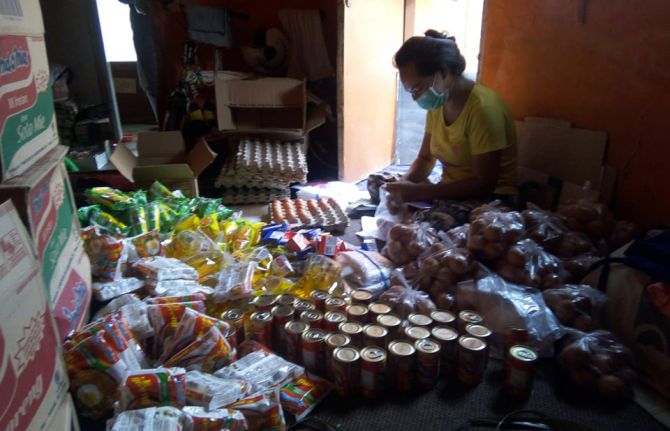
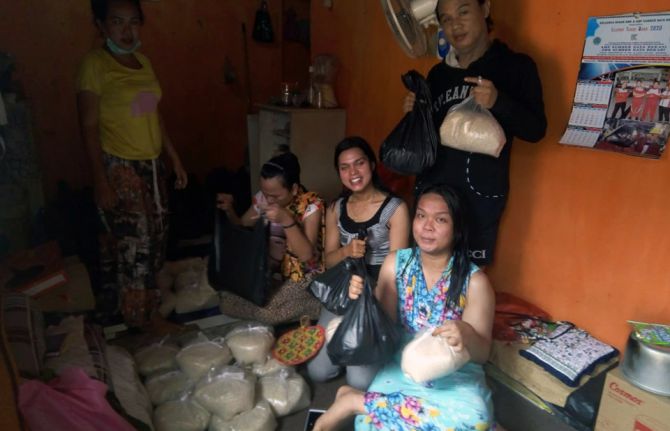
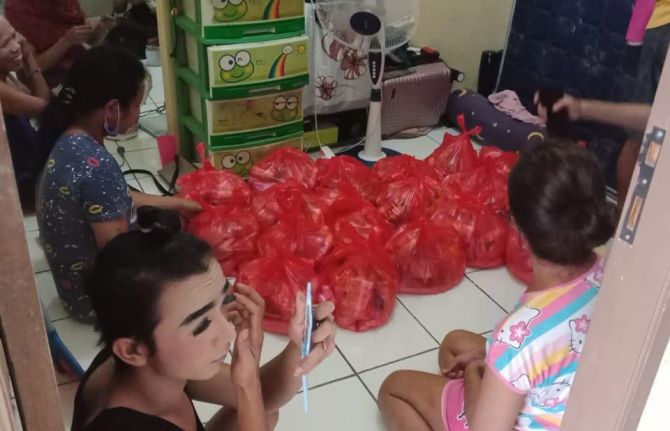
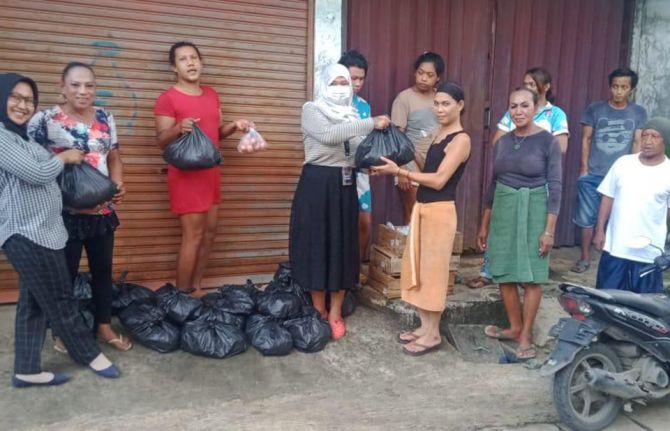
Feature Story
Supporting transgender people during the COVID-19 pandemic
06 April 2020
06 April 2020 06 April 2020The COVID-19 pandemic has disrupted people’s lives around the world, including those of many marginalized people, who suddenly face additional burdens and vulnerabilities.
Many areas in Indonesia, which as of 6 April had 2491 confirmed cases of COVID-19 and 209 deaths, have put in place measures, such as physical distancing, to curb the spread of COVID-19. While effective in responding to the disease, many people have been impacted by the effects of physical distancing on the economy.
Out of 1000 people living with HIV and members of key populations surveyed by the Indonesian Positive Network, more than 50% are experiencing severe impacts on their livelihoods, including many transgender women. Sanggar Swara, a civil society organization of young transgender women in Jakarta, conducted a rapid assessment that found that more than 640 transgender people in greater Jakarta have lost their jobs, leaving them unable to support themselves. “On several occasions when the distribution of basic food staples took place, many of them could not access it as they do not have their identity cards on hand or simply due to their gender identity,” said Kanzha Vinaa, the head of Sanggar Swara.
Seeing the critical need for support, the Crisis Response Mechanism (CRM) Coalition, fronted by the civil society organizations LBH Masyarakat, Arus Pelangi, Sanggar Swara and GWL Ina, with support from UNAIDS Indonesia, decided to raise funds for the transgender community. “Since 28 March, we spread the information about the fundraising to communities and partners. Our plan was to collect the funds and distribute them to transgender women in need, with support from focal points in the areas,” said Kanzha Vinaa.
In less than a week, the CRM Coalition had collected more than IDR 67 000 000—around US$ 4100—and distributed food and hygiene packages to more than 530 transgender women in greater Jakarta. The packages cover the basic needs for one week. Ryan Kobarri, the head of Arus Pelangi, said, “Initially we only expected our close networks to respond to this call for donations. We were elated to see that the support and enthusiasm was much more than we expected. Not just from local networks, but even international networks gave their support. Someone even donated 100 kg of rice!”
Although there is uncertainty over how long the current COVID-19 situation will last, it is very likely that the need will persist in the coming weeks and months. The CRM Coalition continues to welcome donations from all around the world in order to keep the community afloat during these difficult times.
Since its establishment in 2018, the CRM Coalition has worked to coordinate and mobilize resources to respond to the persecution and discrimination faced by lesbian, gay, bisexual, transgender and intersex people in Indonesia, one of the most vulnerable communities in the country.
Donations to help keep this vital work going can be made by PayPal at paypal.me/kanzha or through Ryan Kobarri at ryan@aruspelangi.or.id.
Our work
Region/country

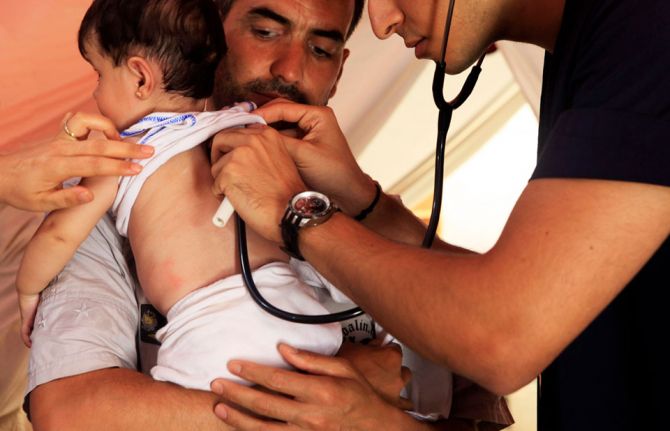
Press Statement
UNAIDS commends Portugal’s decision to grant temporary residency rights for immigrants and asylum seekers
02 April 2020 02 April 2020GENEVA, 2 April 2020—UNAIDS warmly welcomes the decision made by the Portuguese Government to grant temporary residency rights to all immigrants and asylum seekers who applied for residency in the country before 18 March 2020, when the state of emergency for COVID-19 was announced. These rights will give immigrants and asylum seekers access to social and health benefits, including access to the national health service, bank accounts and work and rental contracts, until at least 1 July 2020.
“UNAIDS is urging all countries to adopt a human rights-based approach in responding to COVID-19 that puts people at the centre and respects the rights and dignity of all,” said Winnie Byanyima, Executive Director of UNAIDS. “Portugal has demonstrated leadership and compassion by prioritizing these measures to protect the most vulnerable when responding to COVID-19.”
Migrants face the same health threats to COVID-19 as host populations and must be included to ensure an effective response that addresses both the health and socioeconomic impacts of the pandemic. Migrants and other key and vulnerable populations are often unable to access health and social services owing to fear of deportation, financial costs, legal constraints, language barriers, exclusion and fear of stigma and discrimination. Removing the barriers that prevent people from seeking medical and social care will improve broader public health outcomes, uphold the human rights of the most vulnerable and create a stronger, more effective and more equitable response to COVID-19.
Portugal has pioneered a human rights-based response to HIV since the outset of the epidemic, creating enabling legal environments, enacting progressive drug policies and making HIV treatment free for all, regardless of a person’s migration status. Portugal continues to lead today, driving community-based care models and promoting better integration of health-care services.
To help guide governments, communities and other stakeholders in planning and implementing measures to contain COVID-19, UNAIDS has produced a new guidance document that draws on key lessons from the response to the HIV epidemic, Rights in the time of COVID-19: lessons from HIV for an effective, community-led response.
UNAIDS
The Joint United Nations Programme on HIV/AIDS (UNAIDS) leads and inspires the world to achieve its shared vision of zero new HIV infections, zero discrimination and zero AIDS-related deaths. UNAIDS unites the efforts of 11 UN organizations—UNHCR, UNICEF, WFP, UNDP, UNFPA, UNODC, UN Women, ILO, UNESCO, WHO and the World Bank—and works closely with global and national partners towards ending the AIDS epidemic by 2030 as part of the Sustainable Development Goals. Learn more at unaids.org and connect with us on Facebook, Twitter, Instagram and YouTube.
Contact
UNAIDS GenevaSophie Barton-Knott
tel. +41 22 791 1697
bartonknotts@unaids.org
UNAIDS Media
tel. +41 22 791 4237
communications@unaids.org
Our work
Press centre
Download the printable version (PDF)
Region/country

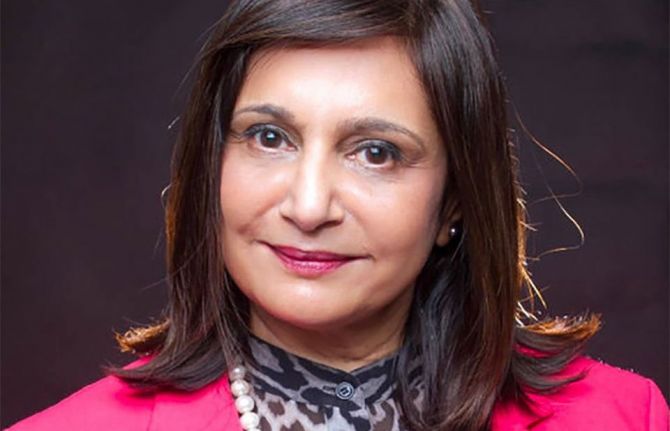
Feature Story
A tribute to Gita Ramjee
01 April 2020
01 April 2020 01 April 2020On 9 March, I checked out of my hotel in Brazil. We had just finished a fascinating meeting on the integration of HIV with other health programmes and diseases. There was plenty of elbow-bumping and embarrassed smiles about the lack of embraces with Brazilian and global colleagues. We knew the wave must be coming, but the beaches still looked beautiful. We even really did drink Corona beer with supper.
I was excited and booked to go straight on to Boston for the 2020 edition of CROI, the conference on retroviruses and opportunistic infections. Apart from the consistently high quality of the science presented at CROI, I always love the corridors. There was always plenty of time to meet up with friends and colleagues, many of whom have been together over the past 25 years or more of the HIV pandemic. I saw Gita Ramjee at every meeting, and was looking forward to seeing her again.
Tragically, it was not to be. My phone pinged with an email announcing that the conference was no longer happening in Boston, but would be delivered virtually.
Gita was already in London on her way to the meeting from South Africa. Hearing that CROI was “virtualized”, Gita was delighted to stay on in London for a few more days. She was spending more time in London lately because she wanted to be with her sons and grandson, who live there. She visited the London School of Hygiene and Tropical Medicine, where she holds an honorary professorship for her work on HIV prevention trials. My colleagues there tell me that she was on her usual good form—kind, collaborative, straightforward and full of integrity and determination to make things happen. She flew back to South Africa that weekend and gave a talk at the London School remotely on 17 March. Two weeks later, she died, one of the first deaths from COVID-19 in South Africa.
Gita is an extraordinary testament to resilience and determination. She was born in Uganda and escaped from the Idi Amin regime. She continued her schooling in India and then went to university in the United Kingdom. There she met her future husband, a South African, also of Indian heritage. She moved to the Transvaal with him, but hated the segregated life, which contrasted so obviously with the more open society she had found in the United Kingdom. So they moved to Durban, which suited them better, and she began to build the two pillars of her life—her family and her career.
Her career as a strong leader of research on HIV prevention, specifically on women, particularly underprivileged women and sex-workers, has brought her global acclaim—lifetime scientific awards for excellence from South Africa, an Outstanding Female Scientist Award from the European Development Clinical Trials Partnerships, honorary degrees. To me, she was always a friendly face and someone to meet and talk to, not only about the science, but also about our sons and grandsons, London, Durban and beyond.
The COVID-19 wave is breaking over us now, and its power is awesome. Gita was a very early casualty of the African epidemic because she was a global superstar. Her death is a stark warning. Millions of poor people living in southern and eastern Africa, many of them living with HIV, are now facing a devastating challenge. The weak health and social systems, the dependence on piece work, the crowded housing, the lack of water and electricity all make it a horrible prospect. The death toll will rise steeply, in part because of direct infections with the virus, but even more so because of the impact on the overstretched health systems and weak social protection safety nets. How are the millions of scared people living in crowded, shared accommodation and dependent on their daily wages to buy food expected to maintain physical distance?
Gita believed in and fought for the rights and welfare of sex workers. Back in 2007, she told the Guardian newspaper, “The stories they used to tell us were horrific. That’s when I knew I wanted to be involved in the prevention of HIV infection in women.” I know that she would want us to step up and meet the challenge of COVID-19, not only as a public health crisis, but even more so as a challenge to inequity, poverty and lack of global solidarity.
Peter Godfrey-Faussett, Senior Science Adviser, UNAIDS
Our work
Related
Documents
Rights in the time of COVID-19 — Lessons from HIV for an effective, community-led response
20 March 2020
Right now, we are facing an unpredictable and highly dynamic situation as a global community. However, as we have seen from the solidarity, support and power of communities in the HIV epidemic and already in communities responding to the COVID-19 pandemic, the response must not be fear and stigma. We need to build a culture of solidarity, trust and kindness. Our response to COVID-19 must be grounded in the realities of people’s lives and focused on eliminating the barriers people face in being able to protect themselves and their communities. Empowerment and guidance, rather than restrictions, can ensure that people can act without fear of losing their livelihood, sufficient food being on the table and the respect of their community. Ultimately it will give us a more effective, humane and sustainable response to the epidemic. This document is also available in Arabic.

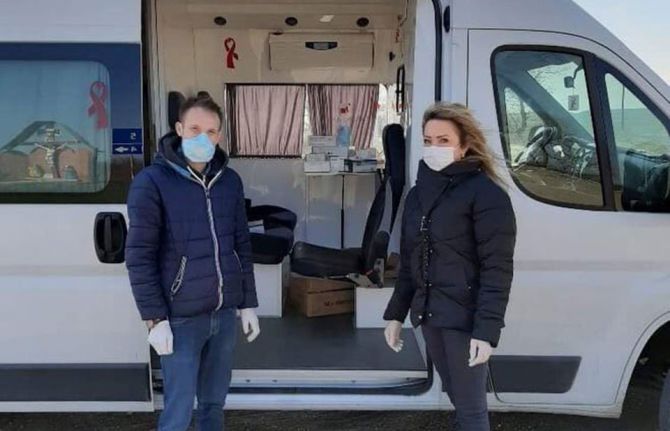
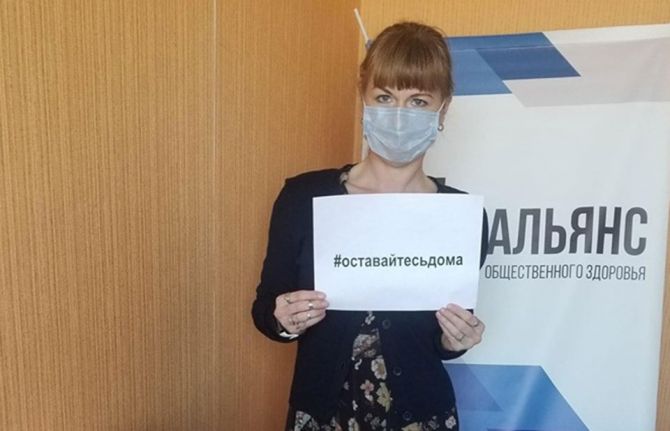
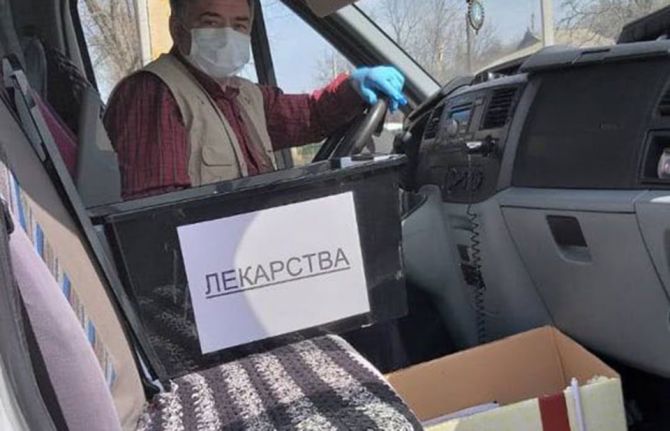
Feature Story
People living with HIV in the Republic of Moldova to receive free home delivery of antiretroviral therapy
02 April 2020
02 April 2020 02 April 2020From 17 March, following the government’s declaration of a state of emergency in response to the COVID-19 pandemic, around 800 people living with HIV in the Republic of Moldova have been receiving antiretroviral therapy at home for free.
A team of social workers and people from the four regional centres for people living with HIV are ensuring the timely delivery of the medicines and are giving information on protection against COVID-19. The social workers, trained by the World Health Organization, explain how to prevent the transmission of the coronavirus, identify its symptoms and take the necessary action in the event that people contract COVID-19.
The emergency measures put in place by the government will initially last until 15 May and include limitations on people leaving their homes except for going to work, buying medicines and food and walking their pets.
AIDS activists agree that the decision will help to avoid the risks encountered by people living with HIV associated with travelling by public transport and going to health centres to get their medication. Most importantly, it will help to avoid interruption of HIV treatment.
“We had to find the most effective solution to this problem, and we are proud that the representatives of the national AIDS programme found a solution,” said Ruslan Poverga, General Director of the Positive Initiative. “The medical sector, social services and nongovernmental organizations are doing everything possible to provide people living with HIV with access to treatment and reduce their risk of coronavirus disease.”
In the Republic of Moldova, more than 6000 people living with HIV are receiving HIV treatment, which they usually get from eight treatment facilities around the country, including prisons. In order to provide the medicines in people’s homes, the National HIV Programme Management Unit developed an algorithm to assess the risk of people living with HIV not being able to access their medicines, taking into account distance from the treatment facilities.
Identifying an efficient solution and obtaining all necessary political support and approval, as well as designing the algorithm and starting the implementation of the programme within one week of work, was made possible owing to the leadership of the Ministry of Health, Labour and Social Protection, the National HIV Programme Management Unit and the Positive Initiative. UNAIDS and the World Health Organization bureau in the Republic of Moldova provided guidance and technical and financial support to ensure the efficient implementation of the initiative.
“The delivery of antiretroviral medicines to people living with HIV in remote, rural and other areas of the Republic of Moldova, where there are no HIV treatment centres, through the involvement of nongovernmental organizations and regional centres for people living with HIV, is an amazing solidarity and mobilization effort by all partners,” said Svetlana Plamadeala, UNAIDS Country Manager for the Republic of Moldova.
Region/country
Related

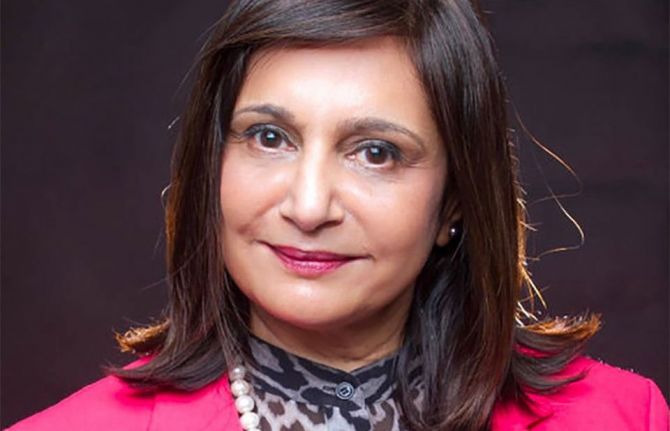
Press Statement
UNAIDS is deeply saddened by the death of pioneering HIV scientist and researcher Gita Ramjee
02 April 2020 02 April 2020GENEVA, 2 April 2020—UNAIDS is shocked and saddened by the sudden death of Gita Ramjee, who died of COVID-19 related complications on 31 March 2020. Her death is an immense loss to the HIV prevention research community. UNAIDS offers its full support to all efforts to stop the spread of COVID-19 and prevent more loss of life.
“I am deeply saddened at the news of the passing of Gita Ramjee,” said Winnie Byanyima, Executive Director of UNAIDS. “She was an eminent scientist who dedicated her life to HIV prevention for women and girls in Africa. Her death is a huge loss at a time when the world needs her most. My condolences to her family, friends and colleagues.”
Ms Ramjee is globally recognized for her ground-breaking research in the field of HIV prevention technologies for women. In 1996, she led a trial on vaginal microbicides for the prevention of HIV among a group of sex workers in Durban, South Africa. The trial was her introduction to the HIV community and was the beginning of her commitment to women-initiated HIV prevention technologies that she pursued with unwavering dedication and commitment for more than two decades.
She held the position of Chief Specialist Scientist at the Aurum Institute, where she worked to improve the health of people and communities through HIV prevention, research and innovation. She previously held the positions of Chief Specialist Scientist and Director of the South African Medical Research Council’s HIV Prevention Unit and Adjunct Professor in the Department of Global Health, University of Washington. She was also an Honorary Professor in the Department of Epidemiology and Population Health at the London School of Hygiene and Tropical Medicine.
Ms Ramjee received several distinguished awards and accolades for her scientific contributions. In 2018, she was awarded the European and Developing Countries Clinical Trials Partnership/European Union Outstanding African Female Scientist Award. She also co-chaired the Microbicide Conferences in 2006, 2008 and 2010 and in 2012 was honoured with the conference’s Lifetime Achievement Award.
UNAIDS mourns her untimely passing and will endeavour to honour her memory by continuing to support global efforts to find methods that enable women to take control of their HIV prevention and reproductive health and rights through informed choices.
UNAIDS
The Joint United Nations Programme on HIV/AIDS (UNAIDS) leads and inspires the world to achieve its shared vision of zero new HIV infections, zero discrimination and zero AIDS-related deaths. UNAIDS unites the efforts of 11 UN organizations—UNHCR, UNICEF, WFP, UNDP, UNFPA, UNODC, UN Women, ILO, UNESCO, WHO and the World Bank—and works closely with global and national partners towards ending the AIDS epidemic by 2030 as part of the Sustainable Development Goals. Learn more at unaids.org and connect with us on Facebook, Twitter, Instagram and YouTube.
Contact
UNAIDS GenevaSophie Barton-Knott
tel. +41 22 791 1697
bartonknotts@unaids.org
UNAIDS Media
tel. +41 22 791 4237
communications@unaids.org
Our work
Press centre
Download the printable version (PDF)


Feature Story
“You’re welcome!”
30 March 2020
30 March 2020 30 March 2020“You’re welcome!”
Sunny Dawson (not his real name) jumped with joy when he received his medicine from Bai Hua. “You're an angel sent by God,” he said to him.
Mr Dawson is an English teacher at a school in a small town in northern China. In January, he went on a vacation to his home country in south-east Asia, but his journey back to China turned out not to be as easy as his journey out. The coronavirus outbreak that started in December 2019 in Wuhan, Hubei Province, and quickly swept across China has posed big challenges to everybody’s life. But because he is living with HIV, the challenges for him were probably greater.
Rushing back to China
News about the outbreak in China hit the headlines in Mr Dawson’s home country during his vacation. “All my family objected to me going back to China,” he said. But he loves China and wanted to go back. “I needed to rush back before flights were stopped,” he said. His family conceded, his father giving him a big bag of face masks before his departure.
He thought he was fully prepared, but when his flight landed, he could feel that things were different. All the passengers had to have their temperature checked, one by one. Mr Dawson was wearing heavy clothes that day and was sweating a little—his temperature read 37.6 degrees Celsius. He and some other passengers were sent to a nearby hospital for further tests.
He tested negative for COVID-19, but soon after learned from the head teacher of his school that the small town he works in has been put under lockdown—he couldn’t go back to where he worked.
Since he is living with HIV, he needs to take antiretroviral medicine every day. He had only taken a one-week supply with him on his vacation, though, and it was running out.
BaiHuaLin alliance of people living with HIV comes in to help
Mr Dawson remembered Bai Hua , the founder of the BaiHuaLin alliance of people living with HIV, a community-based organization dedicated to supporting people living with HIV, including help with refills of medicine. BaiHuaLin was the organization that reached out to him when he was scared and lonely after being diagnosed with HIV a year before.
The coronavirus outbreak left many people like Mr Dawson at risk of running out of their medicine because they were stranded away from their usual HIV service provider. The BaiHuaLin alliance helps people in need of HIV medicine to get their refills by using an extensive network of volunteers that covers the whole country and extends globally. “Too many people need refills these days. We are terribly busy,” Bai Hua said.
When he received Mr Dawson’s call for help, he told him to come to his office immediately to pick up the seven-day refill he had requested. However, only a few days later he had to return for more because his stay in Beijing had been extended indefinitely. “My colleagues told me not to go back in the near future because the shops are closed under the lockdown,” he said. This time, Bai Hua gave him a month’s refill.
A strong partnership
The UNAIDS Country Office in China also felt the impact of the COVID-19 outbreak on people living with HIV. “We received messages on social media from people living with HIV, expressing their frustration and desolation and seeking help,” a UNAIDS staffer said.
Because of HIV-related stigma, when faced with the risk of the disruption of medicines, people living with HIV often choose to keep their anxiety to themselves, afraid to reveal their status. “Some people say they would rather die than disclose their HIV status,” Bai Hua said. “One person sneaked out of his village and walked 30 kilometres to get the medicine.”
The UNAIDS Country Office in China has been working to ensure that the rights of people living with HIV are fully protected. In addition to giving out information, UNAIDS also actively works with the government and community-based organizations in China in order to ensure that people living with HIV get medicine refills.
Special pick-ups and mail deliveries of HIV medicines arranged by UNAIDS have reached more than 6000 people living with HIV in Wuhan.
Best yet to come
Mr Dawson finally got back home to the small town in northern China after staying in Beijing for more than two weeks. Still under quarantine, he misses an old man in the park near his apartment. “He was my calligraphy teacher. He always goes to the park, writing Chinese calligraphy on the ground,” he said. He gave Mr Dawson a piece of calligraphy, beautifully framed, that is now hung on the wall of his sitting room.
“I look forward to the day when the virus is gone,” he said, “So I can visit my friends and learn calligraphy in the park.”
Resources
Region/country


Feature Story
Thai hospitals to provide three- to six-month supplies of antiretroviral therapy
25 March 2020
25 March 2020 25 March 2020Hospitals in Thailand are to dispense antiretroviral therapy in three- to six-month doses in order to prevent people living with HIV from running out of medicines and to reduce their need to access the health system during the COVID-19 pandemic.
The new policy, endorsed by the National AIDS Commission, which is chaired by the Deputy Prime Minister and Minister of Health of Thailand, will be implemented throughout the country, reducing the risk of exposure of people living with HIV to COVID-19 and reducing the burden on the health system and clinical personnel.
People living with HIV who are on antiretroviral therapy under the National Health Security Office (NHSO)—which accounts for 70% of all people living with HIV receiving antiretroviral therapy in the country—are already benefiting from the implementation of this measure. Hospitals under NHSO are extending the length of prescription of antiretroviral therapy for people with a stable HIV condition—people living with HIV who have taken antiretroviral therapy continuously for at least one year, who have suppressed viral loads, who haven’t presented side-effects and who are not pregnant.
“The National Health Security Office has confirmed that there are sufficient supplies of antiretrovirals for all people living with HIV on treatment across the country,” said Rataphon Triamwichanon, the Assistant Secretary-General of NHSO.
“Beneficiaries of the Social Security Insurance Scheme will be able to obtain at least a three-month supply of antiretroviral therapy during the COVID-19 pandemic,” said Amphan Thuwawitm, the Deputy Permanent Secretary of the Ministry of Labor.
Starting from October 2020, NHSO and the Social Security Insurance Scheme will unify the medicine prescription guidelines under the Universal Health Coverage Scheme to allow prescription of a six-month supply of antiretroviral therapy for all eligible people living with HIV.
“UNAIDS applauds Thailand’s leadership and collective efforts from all partners, resulting in timely decisions on implementing multimonth supplies of antiretroviral therapy to support people living with HIV,” said Patchara Benjarattanaporn, UNAIDS Country Director for Thailand. UNAIDS is working closely with the Ministry of Public Health, NHSO, the Ministry of Labor and the Thai Network of People Living with HIV to advocate for the adaptation of the same policy for all health insurance schemes, including private hospitals.
“Through our community members across Thailand, we are monitoring to ensure that hospitals and health-care staff are taking on the implementation of the new policy and are successfully providing multimonth doses of antiretrovirals,” said Apiwat Kwangkeaw, Chairman of the Thai Network of People Living with HIV. “Our peer educators, as members of the Continuum of Care Centre, have also started raising awareness about COVID-19 among people living with HIV and informing them on the precautions they should follow to prevent COVID-19 infection,” add Mr Apiwat.
The Thai Red Cross AIDS Research Center (TRCARC), a civil society organization under the umbrella of the International Red Cross, with support from Her Royal Highness Princess Soamsawali, the UNAIDS Goodwill Ambassador for HIV Prevention for Asia and the Pacific, has also taken important measures to continue to guarantee timely access to HIV prevention services for vulnerable populations.
“We don’t want that the COVID-19 situation becomes a challenging factor that deters people from taking an HIV test. Among the measures we are implementing, we have set up a visible platform outside our Anonymous Clinic with a screening system for every client, where we check temperature and any respiratory symptoms. Our laboratory staff members and counsellors have moved out from the clinic to the platform, where they provide HIV testing and prevention supplies like condoms, post-exposure prophylaxis and pre-exposure prophylaxis (PrEP), as needed. For those who are already on PrEP, we organize home delivery, which clients can request online,” said Nittaya Phanuphak, Chief of Prevention at TRCARC.
All the measures being taken in Thailand will contribute to avoiding potential disruption to HIV prevention, testing and treatment services during the COVID-19 pandemic and to ensuring that people living with HIV and key populations are not left behind.


